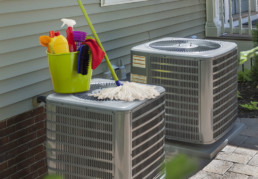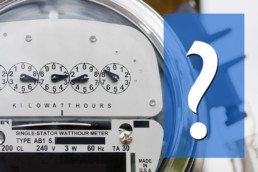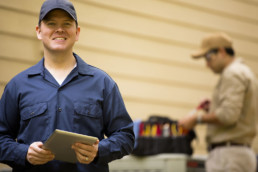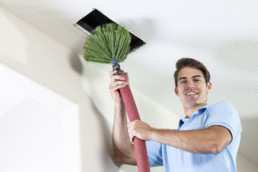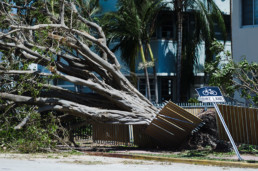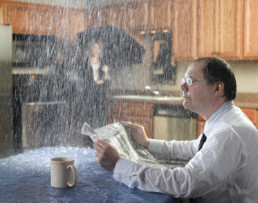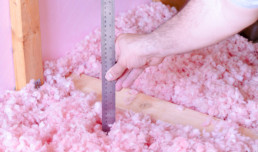Learn the Pros and Cons of Mini-Split Heat Pump HVAC Systems

If you're upgrading your HVAC system or choosing one for a new construction, there are many great heating and cooling products. A mini-split heat pump is a viable option if your home doesn't have ductwork. Learn more about this type of system and how it can efficiently keep you comfortable throughout your home.
Understanding a Mini-Split Heat Pump System
This HVAC installation uses mini-split technology with a heat pump. It's ideal if you already have a ductless system or don't plan to install one. The mini-split is also a great choice when you add a room to your home but extending the ductwork isn't possible.
The system has two main components: an exterior compressor and condenser and an interior air handler in several rooms. It heats spaces by pulling air from outdoors, heating it and releasing it into the rooms. It also cools spaces by pulling warm air out of your house.
Pros of a Mini-Split HVAC System
Mini-split systems offer several advantages to other HVAC equipment, including cost. They're a more affordable option for homes that don't have existing ductwork. Because of their design, they're more energy efficient than central HVAC systems that lose about 30 percent of heated and cooled air in the ducts.
Mini-splits consume less energy too because they maintain zoned temperatures. You can adjust where you need more heating and cooling instead of changing the thermostat for the entire house.
The zoned temperatures also maximize comfort for each person in your home. For example, kids at play indoors might need to turn down the thermostat while you relax in another room that's set for your comfort. The whole family doesn't have to suffer just because one person likes cooler or warmer temperatures.
In addition, there's more flexibility when it comes to installing mini-split systems. They eliminate having to install ducts and only require a small, 3-inch hole in the wall where the handlers connect to the exterior unit. Installers can also hang them on walls, suspend them from the ceiling or mount them into drop ceilings. You can even get floor-standing models.
Cons of a Mini-Split HVAC System
Fortunately, there aren't many disadvantages to choosing a mini-split heat pump for your home. If you already have ductwork, then installing this system may cost more than replacing the central HVAC unit that you have. Although, you might be able to offset the cost with local incentives and rebates.
Installing this HVAC system isn't a do-it-yourself project either. It requires the skill of a trained installer because not placing the exterior and interior units correctly affects how the system functions overall. Having them in the wrong places may reduce the energy efficiency of the whole system. Each air handler also needs to be the correct size for each room to properly control temperature and humidity.
Furthermore, you might not like how the air handlers look inside your home. Vast improvements have been made throughout the years to improve the aesthetics, and many units look quite stylish. However, they're more noticeable than central HVAC vents.
Find Your HVAC System Today
If you need a new heating and cooling system in Venice, Florida, Mahle Inc. Cool Air & Heating offers a complete line of Bryant equipment. Our knowledgeable staff can educate you further about which type of system may work best for your home. Call or Text us today for more details (941) 203-7955.
Save Money This Year With a Clean Central HVAC System
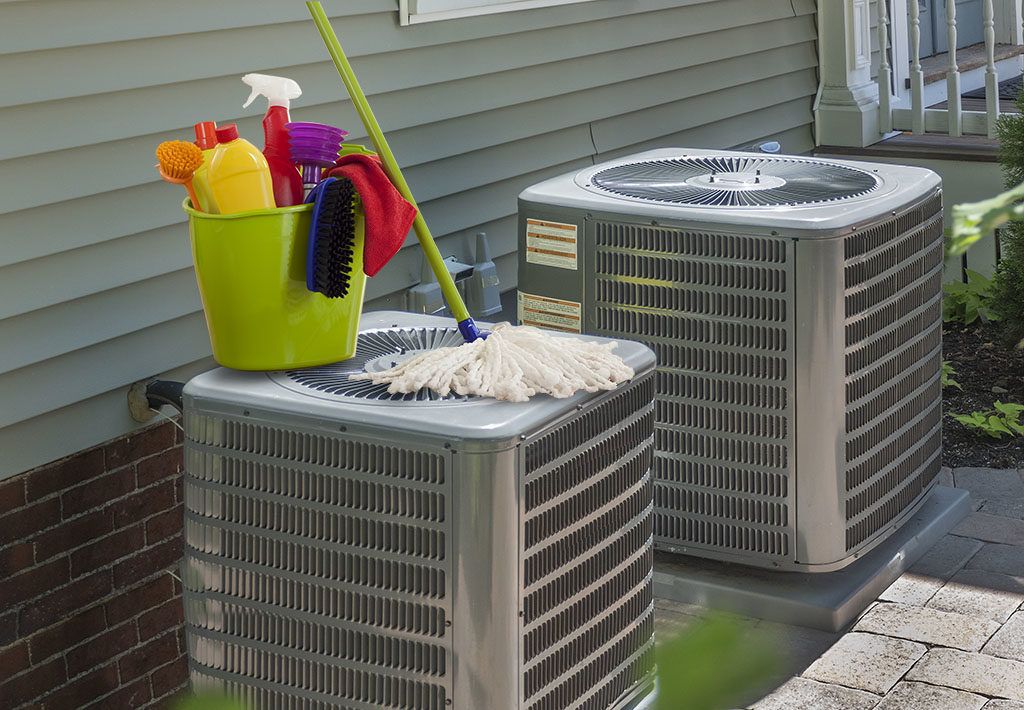
If you are looking for a way to save money throughout the year so that you can safeguard your budget, turning to your heating, ventilating and air conditioning unit is one of the best places to start.
Some people ignore air conditioning maintenance because they want to save time and money, but doing so is expensive when you look at the real cost. A dirty HVAC unit requires more power than normal to operate at its best. When you explore the ways a dirty HVAC unit can cause your energy bill to increase, you will know that taking care of the problem is the smart move.
Dirty Ducts
You might want to take a look at your ventilation system if you have not done so this year. As you run your HVAC unit, dirt can build up and restrict your airflow, forcing your HVAC unit to work much harder, and it will increase your power bill more than you likely suspect as well as expose occupants to allergens, dust particles, and mold.
Dirty Air Handler
Air handler cleaning is another way to decrease your energy bill so that you will have more money to spend on the things you enjoy. Although your filters work hard to protect your HVAC unit, dust and other small particles can still build up if you are not careful. A dirty air handler will put stress on your HVAC unit, and your utility bill can alert you to the problem before you notice the other red flags. Air handler cleaning is always worth the investment when you look at the long run.
Dirty Filters
When air conditioning maintenance is near the top of your mind, you won't want to forget about your filters. The filters in your HVAC unit collect dust, dirt, allergens and other things that will harm the quality of the air in your home. Failing to maintain your filters will enable dirt to build up and block the flow of air. Not only will this problem impact the air you breathe, but it will also affect your energy bill each month. Ensuring that your filters are in good shape is a critical part of the puzzle that will pay for itself in no time.
A Team of Experts on Which You Can Depend
Once you realize that cleaning and maintaining your HVAC unit is an investment that offers impressive returns, you will know what to do. At Mahle Cool Air & Heating, we will perform cleaning and other maintenance tasks that will keep your HVAC unit running at its best for as long as possible. When you enlist our help, a member of our team will come to your location to inspect and address any issues you might be experiencing. Everyone deserves to have fresh, comfortable air at a reasonable price, and we can help you achieve that goal. Call or Text us today for more details (941) 203-7955 and don't forget to check out our specials.
Ho Ho Ho No! Your Fireplace May Be Costing You Higher Energy Bills!
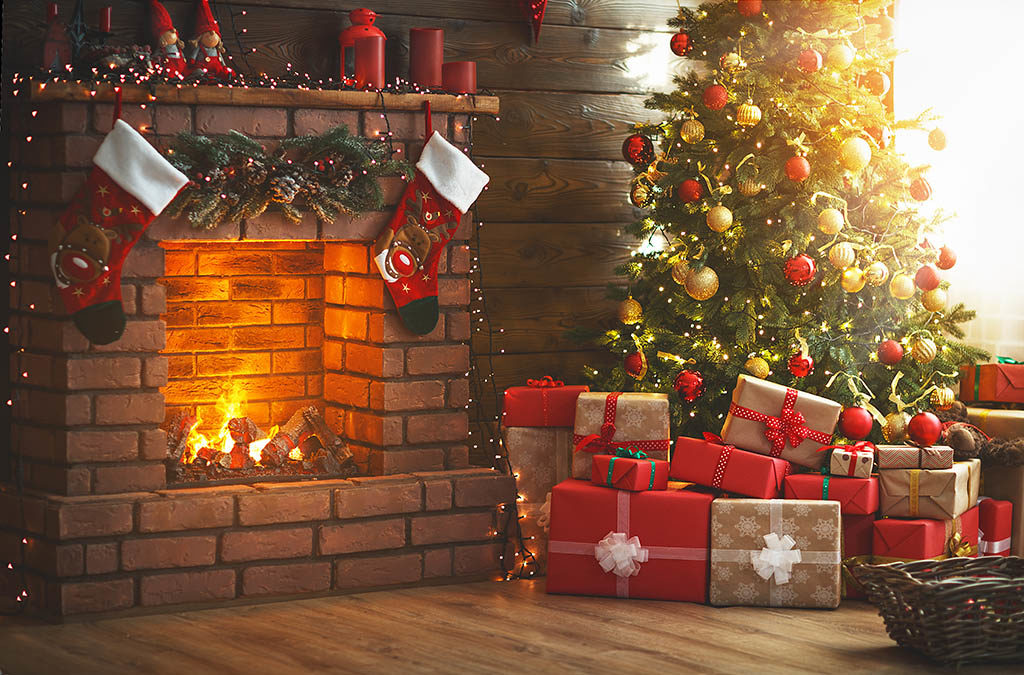
Your Fireplace Could be Increasing Your Energy Bill
If you are like many people who look forward to the months of winter, you likely use a fireplace to keep your home warm while the snow (okay, not in Venice, Florida) is falling outside. Sitting by the fire and drinking hot chocolate on a cold day is one of the simple pleasures in life, but homeowners often use fireplaces to save money on their heating bills, which makes sense from the surface. While correctly utilizing a fireplace can work wonders to reduce your energy consumption, making mistakes can increase your heating expenses more than you might think, and most people are not aware of the threat.
Close the Damper When You Don't Have a Fire
Knowing how your damper works is a good place from which to start when your goal is to avoid wasting energy. The damper in your fireplace allows you to increase or decrease the fire's intensity by making adjustments. It's a metal plate in your chimney that you control with a little valve, and you can open or close it without much trouble.
When you have a fire burning in your fireplace and want to enjoy the best results, keeping the damper open also enables the smoke to escape so that it won't leak back into your home. But when you don't have a fire, leaving your damper open is a waste of money, allowing the warm air from your home to flow outside.
Install Doors on Your Fireplace
Even if you use your damper to prevent warm air from getting outside, you will also want another layer of protection. You will need to have a door on your fireplace to create a seal that will prevent you from wasting energy. If your fireplace does not already have a door, getting one installed is a worthy investment that you don't want to overlook. The right door will go a long way when it comes to reducing your monthly expenses, saving you money over the long run.
The doors that you buy must fit if you want to get the most from your purchase. Reminding other people who live in your home to keep the doors shut is vital when you want to keep your spending under control, and you will know that you have done the right thing.
Seal Your Doors and Windows
Even though using a fireplace will heat your home and keep it warm, most of the heat is lost through the chimney. Depending on the type of fireplace you have, you might lose up to 90 percent of your heat, but you can try a few things to combat the problem.
Knowing how the air in your home flows and the role the fireplace plays will keep you on track. As the warm air escapes through the chimney, the air from the other parts of your home will rush in to replace it. Small cracks in your doors and windows will allow the cold air from outside to enter your home and lower the temperature, and you will want to prevent that from happening.
You can stop fireplace leaking air conditioning by sealing the cracks under your doors and windows with a weatherproof solution. You might not know if air is coming in from outside, but you can conduct a simple test. Place the back of your hand under each door and window in your home to get an answer. If you feel cold air hitting your hand, you have an issue that you need to address. Although it might not seem like much, this step can provide you with impressive results right away, and you will keep a little more money in your wallet each month.
Contacting an HVAC Expert
Although you can take several steps to reduce fireplace leaking air conditioning, you can't compete with the training and experience of a heating, ventilating, and air conditioning expert. You can hire an HVAC expert to search your home and fireplace for signs of energy loss that you can repair to increase your home's energy efficiency.
A talented expert will give you advice on how to get the most from your fireplace and HVAC system so that you won't need to worry about throwing money away. Your HVAC professional will ensure that your doors and windows are sealed and that you don't have issues with your vents. When you consider how much you can save by making a few corrections, you can see why enlisting an HVAC expert is an investment that you don't want to overlook. Call or Text us today for more details (941) 203-7955 and don't forget to check out our specials.
How Much of your electric bill is the air conditioner?
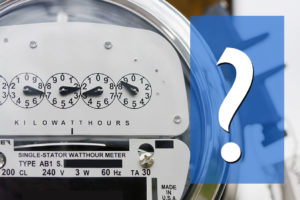
While summer is the hottest time of year, in Florida you will likely need to run your AC even during the winter months to get some relief from the heat and humidity. Air conditioning keeps you cool, helps you to avoid heat stroke, and overall create a more comfortable environment to complete your daily tasks. The cost of heating and cooling is something that is a concern because the average household spent almost 50 percent of their energy bill on cooling costs during the summer months in 2009. It’s beneficial to understand how much your air conditioner energy use will affect your electric bill.
Size of the air conditioner
The size of your air conditioner is the primary factor to consider when calculating your electric costs. Air conditioners are sold in small, medium, large, and extra-large rooms. British Thermal Units (BTUs) is how air conditioners are measured and based on how much square footage they’re designed to cool effectively. A small air unit designed to cool up to 150 square feet is 5,000-6,000 BTUs, while a larger one made to cool 450 square feet averages 10,000 BTU. They can be purchased in BTUs up to 24,000 for rooms up to 1,560 square feet. A larger unit is ideal if you have an open floor plan that allows the air to circulate between rooms.
Other factors
The size of the room isn’t the only thing you need to consider. Factors such as excessive sunlight, rooms that hold more people, and the kitchen benefit from having a unit with a larger BTU. The outside temperature is something else to keep in mind because it will take more energy and runtime to drop the inside temperature to a comfortable level. Well-insulated rooms cool easier and require less electricity, while a room with poor insulation is going to increase your bill a bit more. Check the energy efficiency rating for each unit. The majority of units comply with Energy Star standards to conserve on usage. They use up to 14 percent less energy than the government requirements to qualify for the rating, and in some cases qualify for a tax credit.
Reducing costs
Keep your costs lower by taking additional steps to reduce consumption. Ensure that your unit is adequately rated to cool the room you’re installing it in. A 5,000 BTU air conditioner will not cool a room that is 1,000 square feet. It will need to work at maximum capacity and still be ineffective at cooling down the room temperature. Most units are programmable and allow you to set the temperature while you’re in bed or at work to cut costs. Draw the blinds during the day to keep the sun out and open windows at night to let cool breezes in, instead of running your air conditioner all night long while you’re sleeping. You can even set them to turn on shortly before you get home to cool the house down before you get in the door.
Calculation
A small 6,500 BTU air conditioner will use about 144 kWh running for six hours a day, while a larger 12,000 BTU unit running for six hours every day will use about 270 kWh per month. These are estimates and the settings on your unit and the other factors that impact usage will impact your average consumption. If you’re home all day or need to run your air conditioner at night to be comfortable, your air conditioner energy use will be higher. It's going to fluctuate from month to month depending on how the price for each kWh is on your bill.
Your electric costs also depend on where in the country you live in. Some states have lower rates than others, and they fluctuate from month to month making it difficult to estimate exactly how much running your air conditioner will cost you from one month to the next. Utilize these tips to cool your house down while keeping your costs low. Call or Text us today for more details (941) 203-7955 and don't forget to check out our specials, financing, and rent-to-own options.
Learning About Air Handlers, HVACs and Split Systems
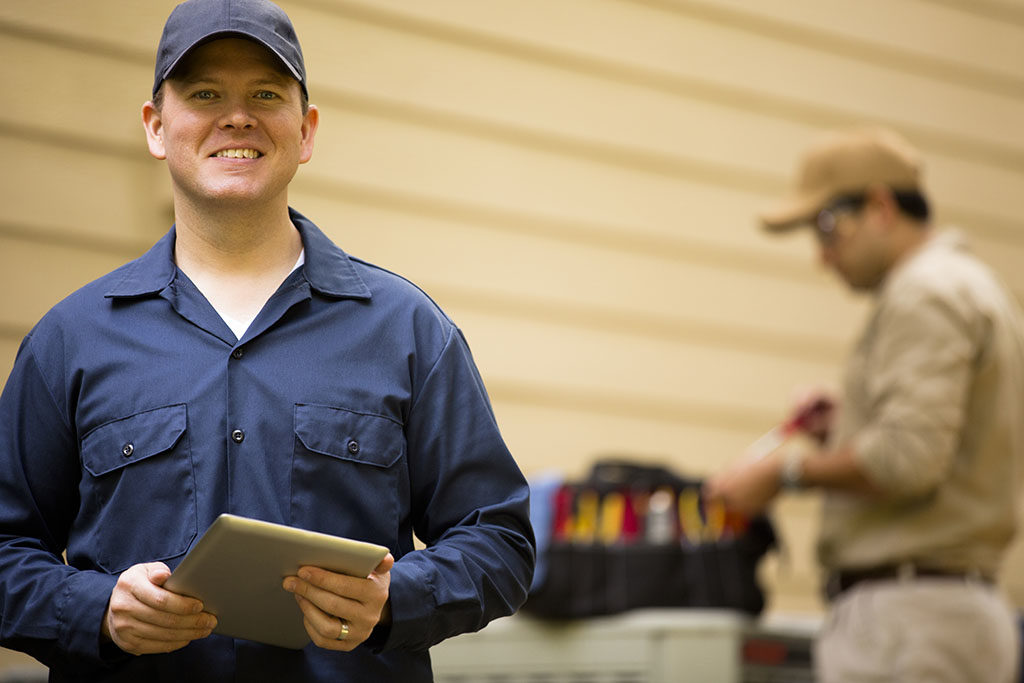
The need for an HVAC system in South Florida goes without saying. While the area has an annual temperature of 82°F its humidity causes the air to feel much hotter. This makes it important to have an air system and air handler that is working at top capacity at all times.
One of the most important parts of your central AC split system is the air handler. Often people are confused about air conditioners believing the whole unit is locate out doors and may not understand the role of the air handler.
Air Handler
The air handler unit is the indoor part of a central HVAC system. With both cooling and heating capability, the air handler is arguably the most important part of a central AC system. Ordinarily located in a building’s interior and may be installed out of the way in a small purpose built closet niche.
Air handlers come in a variety of sizes and flow ratings and are an essential part of a central ac system. Air handlers draw in air from within the home and the air is pulled through coils that contain a liquid coolant. As the air flows over the coils, heat is absorbed into the coils and the air gets cooled. The cool air continues on being pushed by the blower into the building's air duct system. Air handlers also contain filtration to remove particles from the air as it gets cooled. The level of filtration will depend on what sized and types of air filters will fit into the air handler. Some filters can filter out dust and pollen including very small particles even as small as bacteria and other unwanted particles. The filters are essential in HVAC units and allow the unit to perform countless hours without interruption by helping to keep dust from clogging up the vents that surround the coil.
Air handlers also may contain a heater that can be turned on should a heat pump system require additional heat to warm a home, but in the case of Florida, the heaters are rarely needed. In fact most heaters collect quite a bit of dust over the long summer and warm months and that dust may actually smoke and set off the smoke alarms should enough of it build up.
Air Conditioner
The other half of a HVAC system is the out door unit, which most people call the air conditioner (though actually the entire system is the the 'air conditioner').
It is the outdoor unit's job to release all the heat it has absorbed from within the air handler. The coolant from the air handler is pumped into yet more coils that are in the outdoor unit. As in the air handler the coils are encased within vents. The vents increase surface area and aid in heat transfer. At the top of the outdoor unit the large fan forces air through the coils, and in doing so the air absorbs the heat that at coolant has absorbed and removes it from the coolant. The coolant, not cooled is returned inside the home to the air handler to once again absorb more heat and carry it along the cycle.
The outdoor unit usually has five major mechanical parts. These are: a compressor, fan, condenser coil (hot), evaporator coil (cool) and a chemical refrigerant. The hot side is located outside the building and the cold side is located inside. When these parts work correctly the building’s occupants can enjoy an even temperature regardless of the heat or cold outside.
These units are available from a wide variety of manufactures and capacities offering many different features including less noise, energy consumption, longevity, air flow, even more advanced coolants.
In addition to cooling a home, air conditioners perform a function just as vital but not often though of - dehumidifying. When the air in your home is cooled water vapor from cooking, showering and other sources will condense and be drained away. Without this dehumidifying action mold would become a much greater issue in most areas, especially in Florida where we normal have a very high humidity to begin with.
Other Kinds Of Air Conditioning Systems Include The Ductless Mini-Split System and The Terminal Air Conditioner
Split System
A mini-split system HVAC is a ductless unit and contains two parts. A compressor is installed outside, piped through the wall to connect with an inside unit. This makes it possible to cool only one room if desired.
This type HVAC is cost effective and is easier to install than a regular system that requires major installation work such as ducts. All connections are done with electrical wiring and tubing.
There are both mini-split and multi-split arrangements both of which have a thermostat for temperature control. The mini unit consists of an outdoor condenser and a single indoor fan coil. Several of these units can be installed and used to cool an entire building.
A multi unit consists of one condensing unit connected to several air units. When the thermostat is activated all units react simultaneously. While these systems are highly effective, they are not recommended in rooms that do not have the same cooling load.
Ductless split units offer a huge savings on labor and installation cost. In addition, they are small, quiet and powerful and can be modified to fit a wide variety of applications. They have become very popular in recent years with architectural design.
Terminals
Terminals are small units which consist of a coil, air filer and blower, if you have ever stayed in a hotel you likely have seen a terminal air conditioner. While not very efficient, and not a good fit for a home, terminal air conditioners are more simple, and are not a bad option when you only need to cool a small space and do not want to deal with installing air ducts.
When if you need a new unit we, offer high quality products including the complete line of HVAC equipment from Bryant. We also have an emergency service and can have someone at your location in a matter of minutes when your current unit quits working.
At Mahle Cool Air & Heating we offer new HVAC units and heat pumps as well as a "lease to own" program. Regardless of the type of unit you choose, it is essential that it be installed properly if it is to be effective.
We offer 28 years of experience in HVAC installation and repair work in South Florida. All of our technicians are NATE Certified and we offer 100% guarantee on all of our work. We also offer emergency service and reasonable pricing.
Give us a call today at 941-584-6300 and let us help you with your HVAC problems.
Easy Ways To Keep Your Air Conditioner From Breaking
It’s crucial that you maintain your air conditioning unit to make sure it runs smoothly and operates for years to come. No matter what kind of AC unit you may have, it should last for a number of years, as long as you take good care of it. To help get you started, follow our guide below to keep your AC unit in peak shape.

1. Regularly Clean your AC Unit
Even if you have protection on your AC unit, it will still need routine cleanings to run efficiently. Since it’s located outdoors, it’s bound to get dirty, in which case you’ll need to remove dirt, dust, and other debris that can prevent your AC unit from working optimally.
2. Inspect Your AC Unit for Leaks
You should inspect your air conditioner every few months to check for leaks or cracks. However, if you notice a leak in the hose, you could have an air conditioner broken sooner than you think. Proper air conditioner maintenance can help prevent this from happening, as well as any other further damage or sign of wear.
3. Allow Your AC Unit to Circulate Air
Your AC unit’s main purpose is to push cold air into your home, so it’s important that your AC doesn’t suffer from obstructions that can prevent it from doing its job. You can easily do this by opening up your AC unit or having a professional clear the system of any dirt or debris that may be clogging the system.
4. Don’t Run Your AC Unit Non-Stop
If you run your air conditioner 24/7, it will wear out sooner than you’d want, which can cause it to run into a number of problems. If you plan on leaving your home during the day, it’s important that you turn it off before you leave and give it a break once in awhile. Additionally, turning your AC to push air into your home, but not cool it, can help prolong its shelf life and prevent it from burning out.
5. Clean Your AC Unit’s Air Ducts
In some cases, the reason your home may not be cooling fast enough it because your air ducts may be dirty and/or clogged. Cleaning out your AC’s air ducts can easily solve this problem and should be a regular practice. In addition to unclogging your AC system, cleaning your AC unit’s air ducts can also greatly improve the air quality in your home by reducing the amount of dust being pushed into your house via your AC.
6. Change Your AC Unit’s Filter
You should change your air conditioning unit's filter about every 30 to 60 days, depending on how much you are using it. During the summer and other times when your unit is undergoing heavy use, you should change the filter more frequently. Many homeowners forget this step and suffer because of it. With a clogged filter, your unit will have to work harder to complete its job. This lowers the efficiency and costs you more money. Make your AC system last longer and function better by replacing your filters often.
7. Get Routine AC Tune-ups
One of the most important things you can do to extend the life of your air conditioning unit is getting it checked up regularly. Schedule your tune-up with a professional in the spring so you can make sure it is functioning properly in the summer when you really need it. By performing routine air conditioner maintenance, you can keep your unit working in like new condition, catch any problems before they worsen, and prevent new issues from arising.
Here are a few more benefits of routine air conditioner tune-ups:
- Boost Durability: By getting your unit thoroughly checked, you can extend its usable life. Because your unit will be more durable, you can put off buying a new one. This, combined with fewer issues, will end up saving you money.
- Lower your Energy Bills: If your system is maintained properly, it will not need to work as hard to cool your home and reach ideal temperatures. Since the unit does not need to work as hard, it will use less energy and cost less to operate.
- Increase Reliability: When you get your unit tuned up every year, you limit the risk of an air conditioner broken mid-summer when you need it most. You don’t need to worry about emergency repairs when your system is clean and nonfunctional parts are repaired.
Are you finding your AC unit not performing as well as it should be? With the help of our tips above, you should be able to prevent your AC unit from breaking, while improving its performance at the same time. After all, the last thing you want to do is pay hundreds in repair costs for small everyday maintenance tasks you could have done to prevent severe damage to your home’s AC unit.
Dealing With Mold In Your Air Ducts and HVAC System
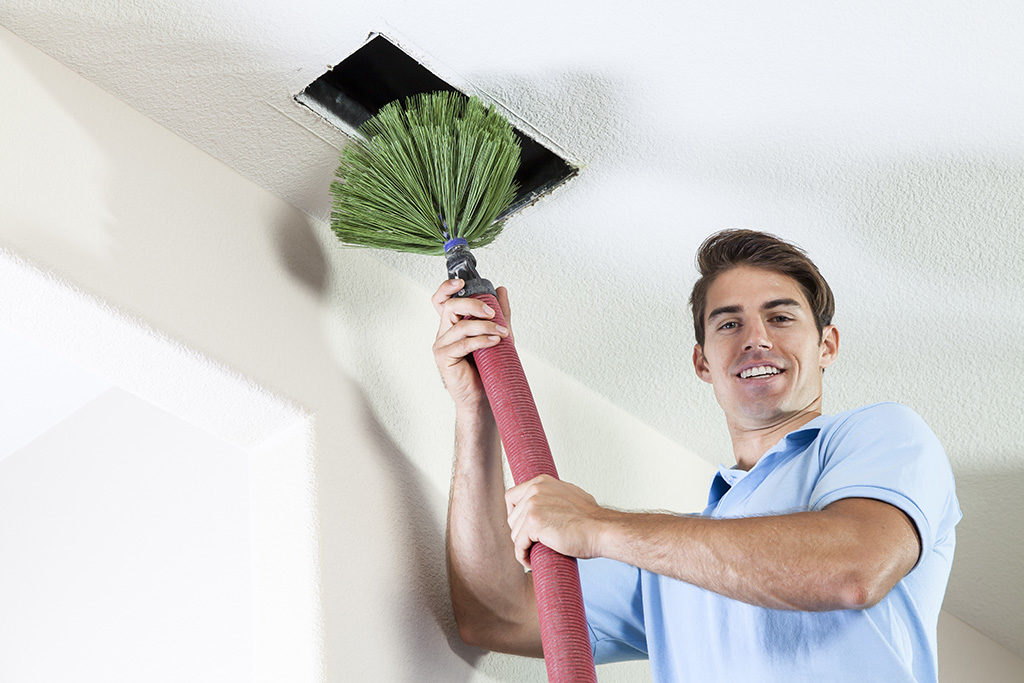
Living in a hot, humid environment certainly has many advantages. You get to enjoy the outdoors all year, you can grow plants that would die in colder conditions and it’s always a good time to hit the beach. One of the disadvantages of living in a climate like this is that these conditions are exactly right for the rampant growth of mold. Unless you take proper precautions, you may end up with mold throughout your HVAC system. This causes many problems with the value of your home and the health of you, your family and your pets. If you suspect that you have a mold problem in your air ducts, read on to find out what you should do about it.
How to Identify a Problem
You may only suspect that your air conditioner is a super highway for mold spores right now. There are a few telltale signs you can look for to confirm your suspicions before you take additional action. Examine the drywall in your home. Pay special attention to the ceilings and areas around crown molding in rooms where high humidity is common, like the bathroom and kitchen. If you see patches of grey or green, that means you have a mold problem. The spores likely incubated in your HVAC system and were transported into your home through your forced air system.
Another telltale sign that you have a mold problem is a persistent musty smell. Any odor that reminds you of an old basement is likely caused by the presence of mold. If you notice the smell more strongly every time your air conditioner comes on, the source of the mold is almost certainly in your HVAC system.
What Causes Mold
In the humid climate of Florida it is not hard for mold spores to find a place with accumulated moisture in your air ducts. Mold does not need light to grow. It only requires enough moisture and a source of food to quickly reproduce to astonishing levels. When you turn on the air, the temperature difference can cause condensation to collect on the air ducts. If you rarely have air duct cleaning done, dust, dead bugs, and pollen all settle into the ducts. These are organic materials that make the perfect mold food.
Once the mold has begun to grow in your system, the constant blasts of air through the ducts carry the spores, essentially mold seeds, through your ducts where they can settle and grow new areas of mold. These spores make their way into your home by entering through the vents.
How This Affects You
The main reason you should care that mold is growing in your home is not due to concern for the aesthetic appearance of any drywall the mold may invade. An abundance of mold causes serious health problems for all those that live in the house. Anyone prone to allergies and asthma will be the first to notice the hazards.
Coughing, sneezing, watery eyes, itchy nose and constricted breathing are the first signs that your mold is out of control. Children and adults with lowered immune systems may also notice angry, red rashes on their skin. You will begin to feel tired all the time even after a full night of sleep. Dizziness, nausea and shortness of breath are also common. These symptoms will be present in both humans and pets. Mold spores in the air are dangerous for those with asthma as it can trigger an attack.
What Testing Involves
Now that you know the dangers of a mold infestation, you may wonder what you can do about it. To confirm that you have mold, you will need a professional from an HVAC company come to your home to test your system. They will take samples to determine the type of mold and how much of it you have. From there, they can make recommendations on how best to fix the problem.
Fixing the Problem
Once the presence of mold is confirmed in your system, you should take immediate steps to stop the further spread of the spores. Begin by turning off your air conditioner. This will halt the movement of spores for the time. You then need to replace all filters and insulation that are essentially spore sponges. All hard surfaces, including the inside and outside of ducts, vents and coils, need to be cleaned with a chemical approved for removing mold from ductwork.
Missing even one step can quickly lead to a recurrence of mold growth. Mold is able to grow incredibly fast under the right conditions. The best way to ensure the mold is completely removed is to hire a professional from an HVAC company. They have the skills and knowledge to completely eliminate the growth with chemicals that can be harsh to work with for those with respiratory problems.
How to Prevent Future Problems
Once your HVAC system is mold free, keeping it that way requires precautions. Removing potential sources of food and water is the best way to ensure you never have to deal with mold again. A regular air duct cleaning and changing your filters remove the organic materials necessary for mold growth from your system. Prevent excess moisture by investing in a dehumidifier, constantly cleaning drip pans and insulating your ducts to prevent condensation from collecting. Without these sources of moisture, the mold cannot thrive.
With any home problem as persistent as mold, leaving this tricky job to professionals is your best course. Follow these steps and you can maintain an mold free home even in this moist climate.
Hurricane Irma Power Outages Show Just How Important Air Conditioning Is For Floridians
It is easy to forget how vital air conditioning has become to this society. This device has made regions across the United States livable that would not be otherwise. An AC helps people in Florida feel serene and fresh though the temperature in the region can get quite high. Hurricane Irma has reminded many Floridians that the AC is more vital than they might have thought before.
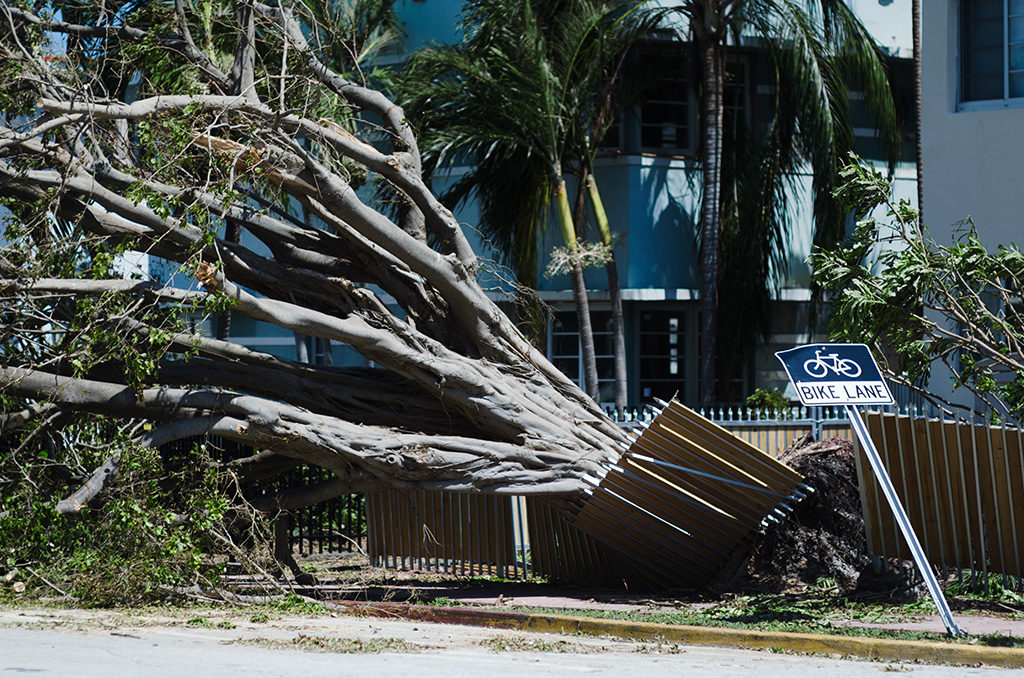
Power outages due to hurricane Irma caused many homes to lose their ability to cool their habitats. One story caught the entire nation's attention since it involved the death of a number of elderly people in a nursing home. No one has clear answers yet, but it seems like the power outage left behind after the hurricane might have shut off the AC, making the home unbearable for those staying in the facility.
The Truth About Florida
Floridians know that the state can be breathtaking. The weather can be nice when it wants to be, and the beaches are dreamy, but everyone knows that nothing is perfect. The state can suffer from all sorts of extreme weather conditions that could lead to things like hurricanes.
This means that flooding and wind damage could occur. Both of these issues could lead to major power outages, which is one reason Floridians need to keep an eye on the weather. It should be noted that extreme weather conditions seem to affect the southern part of the state a little more than others, so areas like Venice, North Port, Englewood, Sarasota, and other nearby areas should do their best to take precautions.
Paying Attention to the AC
It is very easy for homeowners and business owners to take obvious precautions like purchasing adequate insurance, but there are other things that may be overlooked like the AC.
The recent hurricane has shown Floridians that they need to pay attention. Not only is it important to make sure that an issue is addressed by air conditioner repair specialist, but power also needs to be prioritized. The simplest thing that homeowners can do is install a generator, but it does not stop there. Generators are not guaranteed solutions. In fact, these devices need to be tested frequently to ensure that they are in working condition.
It might also be a good idea to talk to an air conditioning specialist about purchasing models that do not use much energy, which could help conserve the generator's power if it is ever necessary. It should be noted that issues with the AC could also overuse electricity in different ways. For example, an AC with a filter that has not been changed in some time might be working a little hard to keep a dwelling cool. The same thing goes with AC systems with air ducts that have not been cleaned. Making sure an air conditioner repair specialist checks the AC helps ensure the AC runs smoothly, which could preserve energy in an emergency.
It should be pointed out that Irma was not able to cause a devastating blackout like the one Floridians suffered back in 2003, which left more than 50 million people without power. In essence, homeowners in the state really do need to plan to deal with outages that may not be taken care of for a while. The power outage back in 2003 was not taken care of for a very long time and was deemed a statewide crisis at the time. Making sure that the machine is working well might become vital at a time, and citizens of Florida have learned this hard truth already.
The fact of the matter is that many cities, communities, and even villages would not be able to survive in many parts of Florida without the comfort of a good AC system. It just goes to show Floridians just how valuable AC experts are and how important it is to have continuous electricity, even if that means using a generator.
Those who want to take a few additional precautions might also want to talk to electrical experts. It might be time to have an expert go through an entire property to make sure that there are no defects that could be affected by a flood more than they should. A good inspection could also highlight any problems with the flood protection measures that are normally integrated in electrical systems. These measures are put in place to protect property and those within the property from things like electrical fires.
There is no doubt that knowledge is power, and being aware of the kind of damage that extreme weather conditions in Florida can cause property owners should make even more be ready for the next threat. This recent hurricane left behind many lessons, including some that are hard to swallow, but these lessons need to be learned.
Of course, the hope is that something like hurricane Irma does not happen again in the state, but hoping for something good does not mean homeowners should ignore the fact that something bad could happen.
Can Your Air Conditioner Cause Water Damage In Your Home?
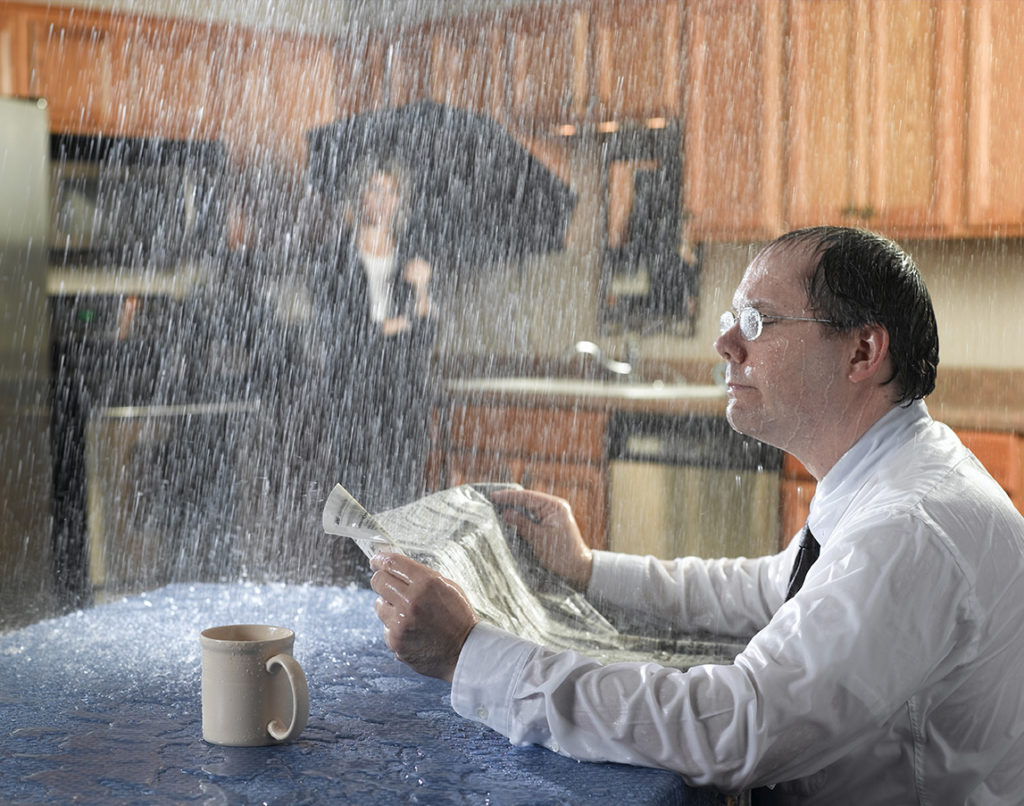
In Venice, Florida the summers get very hot and steamy. Consequently, the air conditioning system in the home or business is under a tremendous amount of pressure to perform well and keep the occupants in the building cool and comfortable. However, problems pop up all the time. The air conditioner is not performing well and is not able to remove that humid air out of the building. Often, this is due to an improper air conditioner maintenance program. This leads to a sweaty cooling unit. Leaks form, resulting in water damage to the property.
Investigating Leaks
Just about everyone that owns an air conditioner notices that the unit leaks at certain times. Perhaps, you've noticed that the unit is leaking a bit more than usual. Certainly, this might be due to running the unit for a long time or other problems might be present. Your unit keeps your building or home cool by removing the humid moisture out of the place. Therefore, it is perfectly normal for the air conditioner to sweat just a bit on a very hot and humid day.
Leaks Cause Damage
Of course, as the property owner, its vital to investigate the cause of the leak. Those leaks might lead to major water damage that destroys the rugs, floors, and building structure. The fact is that those leaks might happen to a window unit or central air conditioning equally. Of course, you could contact a HVAC company to perform air conditioning maintenance and repair the leak. However, it's still a good idea to do a bit of investigative research on your own, before the professionals arrive. Give them the results of your investigation to help zero in on the cause. It's vital to get to the source of the problem because a leak might cause major water damage on the property.
Is Leaking Normal
Leaking is a normal occurrence during an exceptionally hot summer that required constant cooling. However, other circumstances might also exist. One of the top reasons that the unit is leaking might be due to a clogged condensate drainage. The water is collected in the condensate drain and carried into the plumbing system or outside of the building. Now, if the drain is clogged, the process is interrupted. You will probably notice that there is very apparent leaking on the floor, walls, and even outside of the building. It's clearly apparent that the potential for damage is very high. Clogged drains require, the services of a professional HVAC company to remove the clog. They will use professional vacuuming techniques to flush out all the dirt and debris that is causing the clog.
Check For Leaky Pipes
Perhaps, the unit is old and the pipes are starting to leak in the unit. Surprisingly, this is a very common occurrence in older model units. Call in the HVAC team to quickly replace the pipes and your unit will be up and running at maximum capacity promptly.
Frozen Coils
You've probably noticed that your central air unit starts to form ice or freeze over, when it is working extremely hard on a very hot day. The ice forms on the coils, the melting ice causes leaks. If you suspect that this is the problem that is causing the leak, turn off the unit immediately. Let the ice melt. Wipe up any water that drains onto the area, to avoid damage. If this happens on a regular basis, contact the professionals for further diagnosis of the problem and a permanent solution.
Window Units
Most people buy the popular window units because they are very inexpensive. It's easy to buy several units and place them in various areas around the house. However, leaks are fairly common with the window units, which might be due to improper air conditioner maintenance or incorrect installation. It's important to realize that a leak might occur, if the unit is not level. For example, installing the unit with the front tilting in toward the room, might cause the condensation to leak into the room. This is a very curable problem. Simply level off the unit or tilt the unit back, toward the window. This will make it possible for the water to flow outside of the window, instead of the inside of the room.
The majority of minor leakage problems are easily fixed, by the owner. However, major problems require the services of a HVAC team.
Keep Summer Attic Heat Out Of Your Home And Reduce AC Load With This Home Improvement Tip
That nice large attic in your home sure is great for storing all of the stuff you only need part of the year, or even the stuff you just haven't had the time to go through and get rid of, isn't it? It's great to just be able to hide a box or two up there until you need whatever is inside of it again. But something that might not be so great about the attic in your home is the additional cost that can sometimes come with for several reasons.
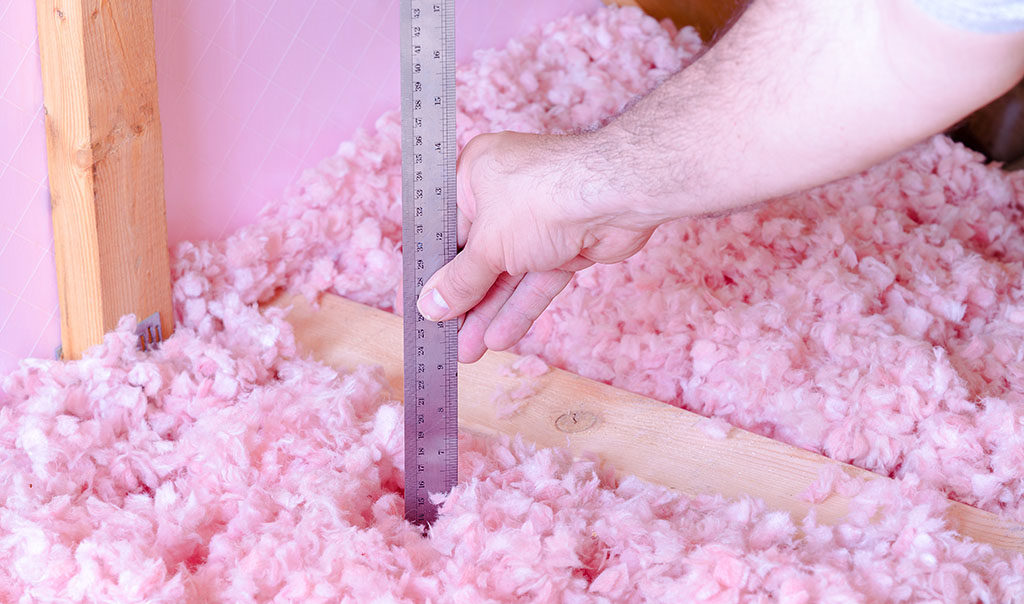
A lot of times this additional space makes your air conditioning work extra hard to keep that extra space as cool as the rest of your home, especially in the grueling summer months we experience. It is expensive and most of the time doesn't work that well, which may or may not be an indicator of an aging air cooling system.
Regardless, sometimes the heat from your attic simply seeps into other rooms in your home, driving up your AC bill and keeping the temperatures high anyway. So let's take a little time to talk about some simple home improvement tasks that can keep that summer heat out of your home, all while helping to lower air conditioning bills while you go about it.
There are a few easy things you can do in regards to cooling your home. The most common of these is to properly insulate your attic space. A lot of times when older homes were built, this step was skipped, which means your attic could be completely uninsulated. And just as often the thought never really occurs to new homeowners to revisit it, which is a shame because it's such a simple step that can really help your home quite a bit with little work required. The first way insulation works is by keeping heat away from and out of your home. This additional barrier helps keep the temperatures down by preventing the sun from penetrating too deep into your home, regardless of ambient temperatures. Even if it's a scorching day outside, the right amount of insulation will work to keep most of that heat where it belongs -- not in your attic. Obviously windows might be a completely different story when it comes to insulation, but this is the best way to keep that heat from seeping through the exterior walls and into your home's living space too.
Since insulation works to keep air molecules where they are, it can also help in cooling your home by reducing the amount of cool air that escapes outside. This means your air conditioner catches a break because more of the cool air it is working to put in your home stays there. This is called convection, or the reduction in the movement of air. If your AC system finds itself having to work less hard to cool your home, that means you'll be seeing lower air conditioning bills too. In this case, the insulation usually pays for itself.
Now, as with any home improvement project, there are things to keep in mind when adding insulation to your home or attic. It might be tempting to go out and buy the thickest possible insulation material you can find. The thicker the material, the more cool air will stay in and warm air will stay out, right? Not necessarily. Once you reach a certain thickness with your insulation material, the results you will see (and feel) usually tend to plateau. There's a unit of measure for this called the R-value. Materials with an R-value between R30 and R60 are usually good enough for most attics to see diminished air bills and experience lowered temperatures. It's also okay to add additional layers if your attic already has some insulation in place, but going above these numbers won't really get you any increased benefits, so it's better to save your money and spend it elsewhere. Of course, this all depends on the size of your attic or the space you'll be insulating too. Keep that in mind.
Another solution besides adding solution to your entire attic is to simply seal potential air leaks that could be hiking up your energy bills. Before you add additional insulation, make sure that pathways between your living areas and the attic are sealed. These can include areas around wiring, plumbing, ceiling light fixtures, vents, and the attic door itself. If it's not a space that's used regularly, there is no need to keep these pathways open. These air leaks can tend to be a huge source of air infiltration and eliminating them can yield huge benefits when it comes to lowered AC bills and lowered temperatures in your home. Plus, it can usually be a lot less work than insulating your entire attic space.
